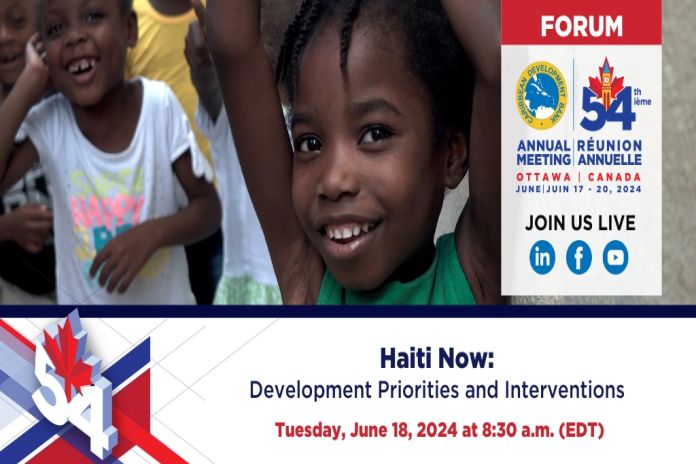HAITI / CANADA – The Caribbean Development Bank (CDB) is set to host an imperative panel discussion titled “Haiti Now: Development Priorities and Interventions” on June 18, 2024 at 8:30 am, during its 54th Annual Meeting in Ottawa, Canada.
The discussion will explore approaches to development in the northern Caribbean country, considering its unique and complex challenges.
Haiti currently has a young labour force, vibrant diaspora, fertile land, and geographic proximity to major markets, yet is stymied in efforts to exploit its economic potential. The country’s structural limitations, including political instability, institutional weaknesses, vulnerability to natural disasters, fiscal crises, and national security issues combine to make it one of the most fragile states in the Latin American and Caribbean region. The upcoming event will provide a platform to examine innovative approaches to sustainable and inclusive development, particularly in light of the recent political crisis and its impact on socio-economic advancement.
“Haiti’s journey towards sustainable development is fraught with challenges, but it is also filled with immense potential,” CDB’s acting president, Isaac Solomon explained. “This panel discussion aims to bring together diverse perspectives and innovative solutions to create a roadmap for the country’s future. By addressing critical issues and fostering collaboration, we can support Haiti in building resilience and achieving its development goals.”
The expert panel, who will share insights and knowledge, includes Corinne Cathala, IDB Country Representative for Haiti, David Comissiong, Barbados’ ambassador to CARICOM, Ronald Gabriel, Governor, Central Bank of Haiti and Prof. Samuel Pierre, a Haitian/Canadian academic currently serving as Professor in the Department of Computer Engineering and Software Engineering at Polytechnique Montréal.
CDB’s vice president of operations (Ag), Therese Turner-Jones will moderate the discussion. The conversation will address the effects of political uncertainty and gang violence on development implementations and highlight measures and recommendations to improve outcomes.
Additionally, the panel will delve into ways regional and international institutions can build social, economic, and climate resilience, and promote political stability to support the nation’s transition to emerging country status by 2030, in alignment with Haiti’s Strategic Development Plan.
Key infrastructure needs will be identified, and discussions will focus on how institutions can strengthen efforts and collaboration to meet these needs. The panel will also explore policy design to ensure that development benefits are equitably distributed, addressing the high levels of inequality in Haiti.





